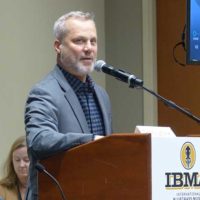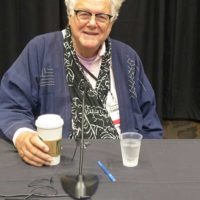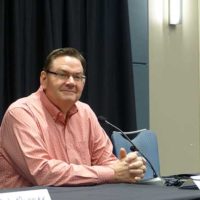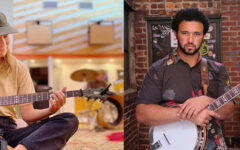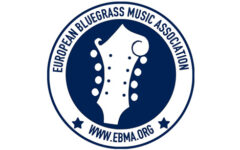
Peter Rowan speaks at the IBMA Session with 2022 Hall of Fame inductees – photo by Sandy Hatley
Friday morning, World of Bluegrass attendees gathered to learn about the three 2022 Bluegrass Music Hall of Fame inductees. Chris Joslin, Bluegrass Music Hall of Fame & Museum Executive Director, served as moderator for the 90 minute session. New inductee Peter Rowan spoke first, followed briefly by Joe Mullins who shared memories of his late dad, Paul “Moon” Mullins, and unfortunately, there was no time left for guitarist, Bob Minner, to talk about master guitarist, Norman Blake.
Rowan shared stories of his early years and his affinity for music. “My uncle Jimmy came home from WWII with a Martin ukulele. He said that he won it in a poker game in Honolulu. He played the tune Bye, Bye, Blackbird. The folklore sparked my interest. I learned ukulele and wrote my own songs. My first song was Blueberry Blues.”
In 1947, in Cape Cod, Rowan spied two guys playing guitars on a porch.
“I was mesmerized. They came over and gave us a concert. It impressed me deeply. I was fascinated with the tone.”
As a student at Collegiate University in New York, Rowan played in a band, the Bonnie Hill Boys.
“I was led astray (from academics) by music. I left school, hungry for bluegrass. I stayed with Jack Tottle.”
The music lover delved deeper into the genre.
“I found the Country Gentlemen. I tried to sing like John Duffey and loved Charlie Waller’s guitar playing. That led me to the Osborne Brothers.”
Rowan eventually was hired by Jim Rooney and Bill Keith to be a Blue Grass Boy.
“Bill Keith was ‘Brad’ because there was only one Bill in Monroe’s band,” he mused.
The new band member had tremendous respect for the Father of Bluegrass. “Blues was my first love. Monroe absorbed the blues.”
In the few remaining minutes, Joe Mullins came to the table to share precious memories of his late father.
“Dad was born in the bowels of Appalachia into extreme poverty. He came from humble beginnings. He had no electricity, no running water, and didn’t see a doctor until he was in the military.
Dad saw the Foggy Mountain Boys when he was 14 or 15 on the Courthouse steps. He was infatuated.”
You could hear the emotion in Joe’s voice as told stories of his dad’s youth.
“He learned guitar as a teenager. His last two years in service, Dad was stationed in Alaska before it had statehood. I have a receipt where he ordered six records in February of 1957. He learned to play the fiddle in the barracks when it was dark 24 hours a day.”
Returning to the lower 48, Paul got the opportunity to backup Carl Story at a Jamboree. His first real gig was fiddler with The Stanley Brothers. They performed for a while in Bristol and performed there, then headed to Florida.
Joe confessed, “Dad had stage fright so bad he would throw up before shows.”
Still young and new to the music scene, he eventually found his fiddle position handed to Chubby Anthony when the Stanleys’ former fiddler decided to return to the band.
“Dad hitchhiked from Florida back to Kentucky.”
Music continued to mold Mullins’ life. In 1960, Paul got a job at WGOH radio in Grayson, KY, as a disc jockey.
“He learned how to be an announcer from Carter Stanley. When Dad moved to Ohio, he came with the nickname ‘Moon’ Mullins after the comic strip character,” explained his son. “He had a great affection for real country music. Loretta Lynn came to the studio and he played Coal Miner’s Daughter on his show. He played country and bluegrass alongside each other: Loretta Lynn and Ernest Tubb with the Stanley Brothers.”
Paul ‘Moon’ Mullins worked to advance in his trade.
“Dad went to a radio station in Middleton, OH. They weren’t hiring. He told them, ‘The guy you got on ain’t worth a damn’ and he got the job.”
Joe then directed audios of his dad to be played that had failed to be played at the Awards presentation the night before. Attendees during the-morning-after session were treated to Paul’s own words from his radio days.
“There’s cold rain outside like a kiss from your mother-in-law,” he stated in the audio recording.
Talking about music, Paul said, “They pushed and shoved, but didn’t speed with it.”
Joe and his dad played in their first band together, The Traditional Grass, starting in December 1983.
“Dad and Grant Turner were the first emcees for Bean Blossom. He was the first emcee for Ralph Stanley’s festival in McClure.”
Joe shared a fond memory of a time they were tuning up for a show in Bean Blossom. “It was raining. The show was moved to the Brown County Barn, original site of the Jamboree. We were in a junk room tuning up. Dad looked over and said, ‘Me and Bill Napier heated up a pan of water on that pot belly stove so Ralph and Carter could shave.'”
Paul ‘Moon’ Mullins received the IBMA Broadcaster of the Year and a Distinguished Achievement Award in 2000.
Joe proudly stated, “His goal to uphold the integrity of bluegrass music.”
With no time remaining, Bob Minner was unable to share stories about the third inductee, Norman Blake. He stood from his seat in the audience and confessed, “I am 56 years old, but I feel like a little kid among giants.”
Joslin agreed, “To get it straight from the source is priceless.”

